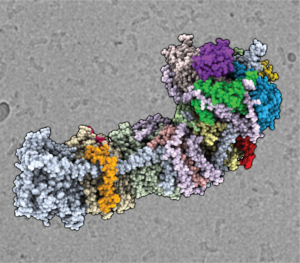Researchers in the Molecular Biophysics and Integrated Bioimaging (MBIB) Division have used a state-of-the-art cryo-transmission electron microscope to reveal the structure of a large protein complex crucial to photosynthesis,  the process by which plants convert sunlight into cellular energy. Staff scientist Karen Davies (pictured) led the team that included first author Thomas Laughlin, a UC Berkeley graduate student who has an MBIB joint appointment, as well as researchers from Groupe d’étude des protéines membranaires (GEPROM) at the University of Montréal and McGill University.
the process by which plants convert sunlight into cellular energy. Staff scientist Karen Davies (pictured) led the team that included first author Thomas Laughlin, a UC Berkeley graduate student who has an MBIB joint appointment, as well as researchers from Groupe d’étude des protéines membranaires (GEPROM) at the University of Montréal and McGill University.
The finding, published in the journal Nature, will allow scientists to explore for the first time how the complex functions and could have implications for the production of a variety of bioproducts, including plastic alternatives and biofuels.
The researchers targeted the NADH dehydrogenase-like complex (NDH), which is known to help regulate the phase of photosynthesis  where the energy of sunlight is captured and stored in two types of cellular energy molecules, which are later utilized to power the conversion of carbon dioxide into sugar. The NDH complex was isolated from membranes of a photosynthetic cyanobacterium provided by the Junko Yano and Vittal Yachandra lab in MBIB.
where the energy of sunlight is captured and stored in two types of cellular energy molecules, which are later utilized to power the conversion of carbon dioxide into sugar. The NDH complex was isolated from membranes of a photosynthetic cyanobacterium provided by the Junko Yano and Vittal Yachandra lab in MBIB.
Read more in the Berkeley Lab press release.



